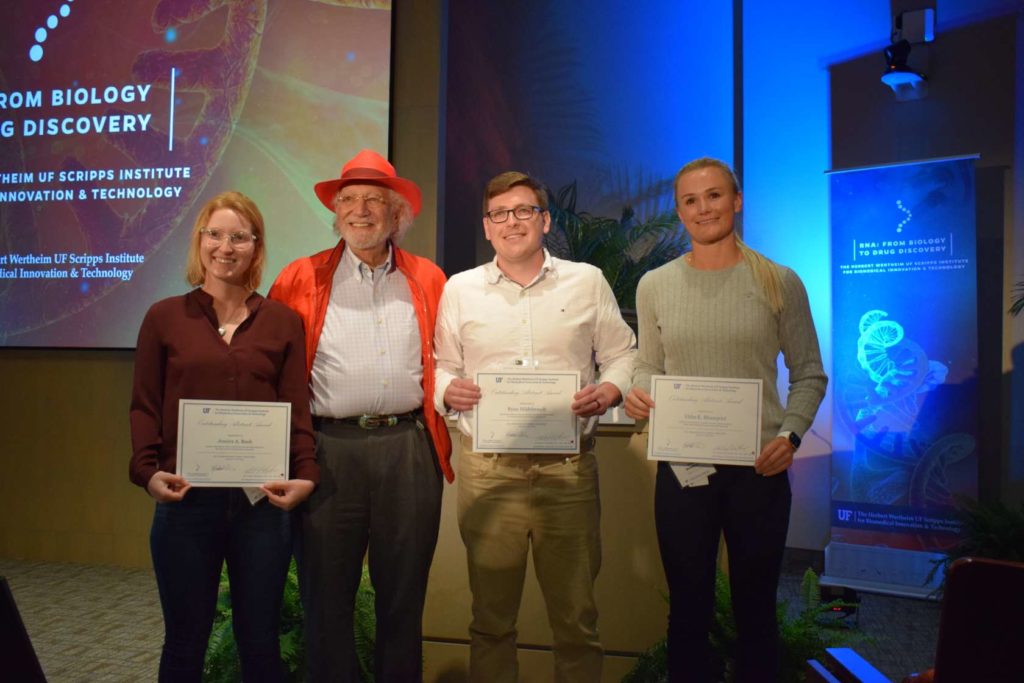ASGCT Honors UF Scientist with 2023 Outstanding New Investigator Award
The American Society of Gene & Cell Therapy (ASGCT) has awarded the Outstanding New Investigator Award for 2023 to Manuela Corti, PhD from the University of Florida, in recognition of her contributions to the field of gene and cell therapy. Recipients of this award come from academia, research foundations, government, or industry.
UF Research Foundation Names 2023 Professors
The University of Florida Research Foundation has named 34 of the university’s most productive and promising faculty members as UFRF Professors for 2023.
Newly Discovered Probiotic Could Protect Caribbean Corals Threatened by Deadly, Devastating Disease
Researchers with the Smithsonian’s National Museum of Natural History and the University of Florida have discovered the first effective bacterial probiotic for treating and preventing stony coral tissue loss disease, or SCTLD, a mysterious ailment that has devastated Florida’s coral reefs since 2014 and is rapidly spreading throughout the Caribbean.
UF Diabetes Institute Director To Be Honored by the American Diabetes Association
University of Florida College of Medicine researcher and UF Diabetes Institute Director Mark Atkinson, Ph.D., is the recipient of the American Diabetes Association’s 2023 Harold Rifkin Award for Distinguished International Service in the Cause of Diabetes.
3D-Printing the Brain’s Blood Vessels With Silicone Could Improve and Personalize Neurosurgery – New Technique Shows How
UF Innovate inventor, Thomas Angelini, an associate professor of mechanical and aerospace engineering, and Senthilkumar Duraivel, a Ph.D. candidate in materials science and engineering at UF’s Herbert Wertheim College of Engineering, recently published research into a new technique for creating a replica of the brain using 3D printing
UF Will Spearhead DARPA Mission To Pioneer Crucial Biomanufacturing in Space
With the goal of creating a resilient supply chain for a sustained presence in space, researchers at the University of Florida (UF) are bioengineering microbes for experimentation on the International Space Station (ISS) they hope will reliably produce biopolymers, nutraceuticals, and antibiotics in variable gravity conditions.
UF Researchers Create Method To Predict Leukemia Drug Complications
A team of University of Florida researchers, led by UF Inventor Jatinder Lamba, Ph.D., associate dean of research and graduate education and a professor in the UF College of Pharmacy, made a comprehensive pharmacogenomics evaluation of key genes involved in the pathways of several commonly used drugs to treat acute lymphoblastic leukemia, or ALL, the most common type of leukemia in children.
UF Health Scientist Lands First-Ever NIH Grant for a Rare Disorder Devastating Lives of Kids
UF Health biochemist and molecular geneticist Andrew Liu, Ph.D., and his collaborators were awarded a $2.4 million, five-year grant in January to investigate the genetic underpinnings of Smith-Kingsmore syndrome, or SKS.
Nuclear Sleuths: University of Florida To Lead $25 Million National Consortium on Nuclear Forensics

The project, funded by the U.S. Department of Energy’s National Nuclear Security Administration (NNSA), aims to prepare 135 undergraduate, master’s and doctoral students to help federal laboratories throughout the United States address current and future needs in nuclear forensics, and to replace an aging workforce.
RNA Symposium Attracts Thought Leaders in Basic and Translational Research to Jupiter, FL

More than 175 people attended “RNA: From Biology to Drug Discovery” at The Herbert Wertheim UF Scripps Institute for Biomedical Innovation & Technology. It was the first major scientific conference at the institute since the pandemic began, and so researchers relished the opportunity to share recent work and reconnect. The conference attracted 18 impressive outside speakers, including multiple Howard Hughes Medical Institute investigators, members of the U.S. National Academy of Sciences and the Institute of Medicine. Incoming Max Planck President-Elect Patrick Cramer, Ph.D., shared his structural studies of the machinery underlying DNA transcription, featuring riveting imaging of transcription complexes in motion.
